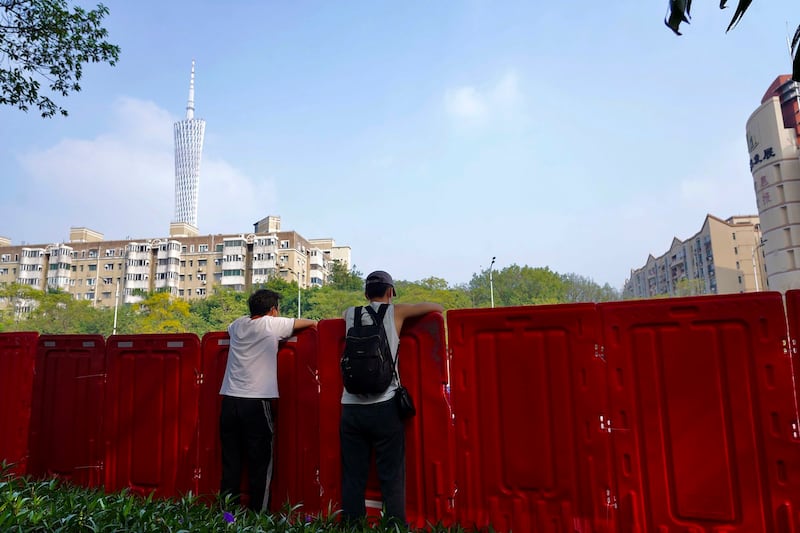Eight local government officials in the southern province of Guangdong have been named and shamed for "lying flat," a buzzword describing people who have decided it's no longer in their interest to try hard in life.
The Nanshan township government issued a list of eight people targeted for "lying flat" in a document dated Dec. 23, following a meeting earlier in the month.
The move – which officials said could be aimed at fat-trimming unproductive employees – comes as cash-strapped local authorities across China struggle to pay public employees amid a burst property bubble and an increasingly grim outlook for the world's second-largest economy.
Local officials later confirmed to the media that a photo of the document circulating on social media was genuine, the Yangtze Evening News reported online.
While it has also been used to describe unemployed young people who see no point in trying any more due to the economic downturn, "lying flat" in this context appears to mean officials who simply aren't trying very hard.
The eight officials will now be investigated, and placed under "rectification" measures for six months if found to be slacking off, according to Jimu News and Dawan News.
It’s complicated
An employee who answered the phone at a government sub-district office in Guangdong's Foshan city who gave only the surname Zeng for fear of reprisals said the issue may not be as simple as it first appears, however.
"Local government personnel matters are … complicated," Zeng said. "Usually, these things come from a specific source [higher up] who is telling everyone under them to do something, or perhaps criticizing them for doing something wrong."
"The orders from higher up are constantly changing," he said.
But he said slackers do exist.
"Some people just rely on the government for their livelihood, but don't even come to work," Zeng said, adding that many such officials get their jobs through personal connections, and aren't asked to do anything.

Zeng said it's possible that the Nanshan government is targeting such individuals in a bid to cut its costs at a time when local governments are running out of cash.
A retired Guangdong civil servant who gave only the surname Ye agreed, saying many draw official salaries while doing nothing to earn them.
"There are a lot of people who draw free salaries," Ye said. "They can be found all over the country."
"They don't turn up for work, yet they still get paid."
Ye said it remained to be seen if the Nanshan initiative would be effective.
"Maybe the mayor will tell them that if they don't perform better, they'll be transferred to another place to work," he said.
‘Tiger Army’
The move comes after Nanshan Sanshui district party committee member Huang Hengjian said the government is looking to transform civil servants into a "Tiger Army" of crack cadres, putting people on lists and handing out accolades to "star" performers, as well as naming and shaming those who "lie flat."
Huang told Dawan News that the government had done large-scale research into working practices, interviewing more than 170 employees.
Government workers in the eastern provinces of Zhejiang and Jiangsu, as well as in Shigatse, Tibet, have previously been "admonished" by the authorities for "lying flat" in recent months, but no punishments have yet been reported, according to Dawan News.
Local governments have been hit by the triple whammy of increased pandemic spending while absorbing tax reductions, exemptions and early tax refunds, as the ongoing downturn in the real estate industry has led to a sharp drop in land transfer fees, which once accounted for 40% of local fiscal revenues, analysts have told Radio Free Asia in recent interviews.
Financial analysts have estimated that around one-third of public expenditure last year went on the rolling lockdowns, mass quarantines and compulsory daily COVID-19 testing programs of ruling Chinese Communist Party leader Xi Jinping’s zero-COVID policy, which ended in December 2022.
The policy left local governments struggling with an ever-mounting debt burden.
Translated by Luisetta Mudie. Edited by Malcolm Foster.
